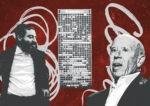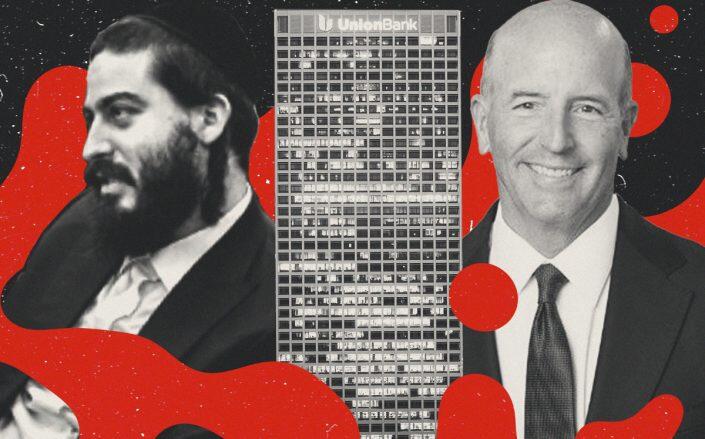Joel Schreiber, one of real estate’s greatest enigmas, is finally telling his side of the bizarre Union Bank Plaza saga.
Schreiber went into contract in 2022 to buy the 40-story office tower in Downtown Los Angeles for $155 million. After 11 extensions, he bargained down the closing price to $104 million. This year, Schreiber’s group sold the building for $80 million.
But despite the apparent paper loss, Schreiber’s team made money on the deal, according to Newmark, which brokered it.
Schreiber’s shrewd dealmaking and ability to profit in the languishing Downtown L.A. office market amazed some in the industry and on real estate Twitter. It came at a time when Schreiber was also facing about $120 million in personal judgments.
In a recent deposition, the media-shy Schreiber discussed the sale for the first time.
Schreiber said he had no equity in the deal. The only money he stood to make on the building was a fee, which he would share with Cushman & Wakefield for managing the property.
But Schreiber was the one negotiating with the lender.
Schreiber agreed to a personal guarantee on the deal’s mezzanine loan, making him personally liable in the case of a bad act. By Schreiber’s telling, the lender did not care that he had no funds to honor the guarantee.
Schreiber’s deposition stemmed from a lawsuit against him by a Starwood Capital Group entity that had lent $213 million on another Schreiber building in L.A., the Broadway Trade Center, in 2018. Starwood foreclosed on the property four years later. But a New York state judge allowed Starwood to go after Schreiber for $88 million — the difference between the credit bid it acquired the property with and Schreiber’s outstanding debt.
Schreiber says he is broke and cannot pay what he owes. But Starwood is dubious. A Starwood lawyer has grilled Schreiber on his use of private jets and a $151,000 charge for his son’s wedding. The lender has requested documents about Schreiber’s finances and assets and questioned him about Union Bank Plaza.
Starwood is seeking to hold Schreiber in contempt for failing to hand over documents. He has a hearing in January and faces the real possibility of jail time.
To many in New York City real estate, Schreiber is a riddle. He pleads poverty, but cashed out his WeWork stock with SoftBank for at least $44 million and is buying skyscrapers He routinely finds himself in disputes with lenders and investors. He lives in Borough Park in the insular Hasidic community, but has forged friendships with startup founders Ryan Breslow and Adam Neumann.
The Union Bank Plaza deal only added to Schreiber’s mystique.
Schreiber said his initial plan was to sign a contract to buy for the 40-story building from a real estate investment trust run by KBS, then flip the contract — a risky practice known as wholesaling. His main investors were Samuel Kraus and a firm called Kindred Equities. (The Real Deal could not find any information about either one; a Sam Kraus of Regent Properties said he was not involved in the deal.)
“The business plan was to negotiate to buy an asset and try to sell it,” said Schreiber in the deposition.
But Schreiber could not find a buyer, so instead he closed on the property. Schreiber obtained 11 extensions and haggled down the sales price to $104 million. He bought it just days before L.A.’s “mansion tax” would have added a 5.5 percent surcharge.
During that time, U.S. Bank had acquired Union Bank, which occupied about 30 percent of the building and had about 13 years left on its lease. (It later bought out the lease, reportedly making Schreiber’s group money.)
Schreiber said that the closing was a “nightmare” and that it was almost impossible to get financing, but he found a lender of last resort in Don Hankey.
Hankey had made a fortune in subprime auto lending and is known for charging high interest rates. Schreiber’s group was able to secure a $70 million loan from Hankey after securing a short-term bridge loan. Schreiber’s team paid off $35 million and BH Properties joined as a mezzanine lender, a source close to the deal told TRD.
As it happens, Hankey, 81, had worked in Union Bank Plaza in his late 20s. He told TRD that he was essentially lending on what he perceived to be the value of the building.
“It’s a nice piece of property in a good location,” said Hankey.
Schreiber managed the entity that paid for the property, but said the money came from Kraus. But Starwood noted that $10 million of the $104 million acquisition price flowed from a company affiliated with Schreiber called Rocky Capital.
Schreiber said Rocky was merely a pass-through entity for another investor. When Starwood’s lawyer asked about the need to use Rocky at all, Schreiber responded, “That’s what it was.”
Starwood also mentioned that $17 million came from the law firm Nussbaum Lowinger. The law firm’s name partner Marc Nussbaum has popped up in a number of legal entanglements with Shaya Prager and Yoel Goldman’s All Year Holdings. Schreiber said the Nussbaum law firm represented a bridge lender that was needed to close on the Union Bank Tower acquisition.
“The investor had most of the money, and I guess maybe he needed a bridge. And that’s where
Nussbaum came in and helped provide the bridge,” said Schreiber.
In the deposition, Schreiber was asked about a guarantee he provided on the mezzanine loan. If Schreiber had no equity in the deal, why would he provide a guarantee?
“I needed to make sure this deal closes,” said Schreiber.
Starwood’s attorney mentioned that the loan terms Schreiber had signed had certain language, including that the borrower would make a direct or indirect benefit from the loan.
“I’ll be honest — I didn’t read that,” said Schreiber.
The guarantee also required Schreiber and Kraus to have $50 million in net worth and liquid assets of $7 million. Schreiber said he did not have any assets, but he believed Kraus did, although he did not check.
“I remember I had a conversation with the lender, and they knew I didn’t have the liquidity. And they were fine,” said Schreiber.
In October, Schreiber’s Waterbridge sold the tower to Southwest Carpenters Pension Trust for $24 million less than Schreiber’s group had paid for it. But that was offset by the large lease pay-out from Union Bank. Schreiber said he did not get any of the pay-out.
The Pension Trust plans to occupy a large part of the building and lease the rest, according to a release.
“This was a win-win transaction,” Newmark broker Kevin Shannon said in a statement at the time of the sale, “for the buyer and seller.”
Read more



